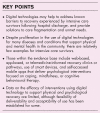Digital solutions and the future of recovery after critical illness
- PMID: 37598320
- PMCID: PMC10487369
- DOI: 10.1097/MCC.0000000000001075
Digital solutions and the future of recovery after critical illness
Abstract
Purpose of review: Digital technologies may address known physical and psychological barriers to recovery experienced by intensive care survivors following hospital discharge and provide solutions to care fragmentation and unmet needs. The review highlights recent examples of digital technologies designed to support recovery of survivors of critically illness.
Recent findings: Despite proliferation of digital technologies supporting health in the community, there are relatively few examples for intensive care survivors. Those we identified included web-based, app-based or telemedicine-informed recovery clinics or pathways offering services, including informational resources, care planning and navigation support, medication reconciliation, and recovery goal setting. Digital interventions supporting psychological recovery included apps providing adaptive coping skills training, mindfulness, and cognitive behavioural therapy. Efficacy data are limited, although feasibility and acceptability have been established for some. Challenges include difficulties identifying participants most likely to benefit and delivery in a format easily accessible to all, with digital exclusion a resultant risk.
Summary: Digital interventions supporting recovery comprise web or app-based recovery clinics or pathways and digital delivery of psychological interventions. Understanding of efficacy is relatively nascent, although several studies demonstrate feasibility and acceptability. Future research is needed but should be mindful of the risk of digital exclusion.
Copyright © 2023 The Author(s). Published by Wolters Kluwer Health, Inc.
Conflict of interest statement
Figures




References
-
- Herridge M, Azoulay É. Outcomes after critical illness. N Engl J Med 2023; 388:913–924. - PubMed
-
An excellent overview of recovering from critical illness.
-
- Stelfox H, Leigh J, Dodek P, et al. . A multicenter prospective cohort study of patient transfers from the intensive care unit to the hospital ward. Intensive Care Med 2017; 43:1485–1494. - PubMed
-
- Misak C, Herridge M, Ely E, et al. . Patient and family engagement in critical illness. Crit Care Med 2021; 49:1389–1401. - PubMed
Publication types
MeSH terms
LinkOut - more resources
Full Text Sources
Medical
Research Materials

